Chiacchiere con Chiara: Kamin Mohammadi a me sembra uscita da un libro di favole della antica Persia: alta e fiera come una principessa, con i suoi riccioli neri e i grandi occhi che brillano – Il suo italiano è , oramai, perfetto e la nostra conversazione, fin dall’inizio, è stata spontanea , passando da un argomento all’altro, come se fossimo al tavolino di un bar. 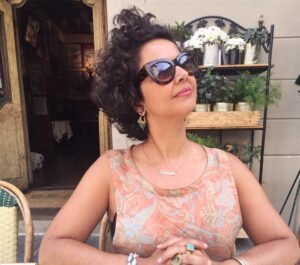
Kamin (la ‘Hamin ..come la chiamano a Firenze, con la tipica C aspirata toscana e l’articolo erroneamente messo prima del nome) è una celebre giornalista e scrittrice iraniana ed inglese, che attualmente vive in Toscana ed è la nuova ospite del podcast Chiacchiere con Chiara. ( l’episodio online a partire da Agosto 25,2023)
Nata in Iran, è arrivata in Inghilterra in esilio nel 1979. Ha scritto per The Times, Financial Times, the Guardian, tanto per citare alcune testate. Il suo primo libro è The Cypress Tree ( in taliano ” Mille farfalle nel sole”) ma io l’ho scoperta qualche anno dopo, leggendo il suo Bella Figura. Qui Kamin ci offre la sua interpretazione del concetto “tutto italiano” di “bella figura”e ci parla della sua esperienza con la lingua e la cultura italiana. Una chiacchierata, registrata all’inizio di Giugno di grande ispirazione per me, e spero anche per tutti voi!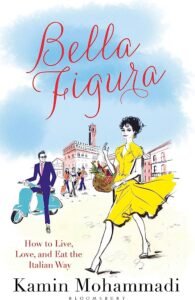
(EN) Kamin Mohammadi reminds me of a character from a Persian fairy tale: tall and proud like a true princess, with her black curls and big sparkling eyes – Her Italian is now perfect, and our conversation, right from the start , was spontaneous, moving from one topic to another, as if we were at a table in a bar. Kamin ( la ‘Hamin ..as they call her in Florence, with the typical Tuscan soft C and the article, erroneously placed before the name) is a renowned Iranian and English journalist and writer, who currently lives in Tuscany. She is the new guest of my interviews for the podcast “Chiacchiere with Chiara”(this specific episode online starting from August 25th)
Born in Iran, she arrived in England in exile in 1979. She writes for The Times, the Financial Times, the Guardian, just to name a few. Her first book is The Cypress Tree but I discovered her a few years later, reading her Bella Figura. In this book, Kamin offers us her interpretation of the Italian concept of “bella figura” and talks about her experience with the Italian language and culture. This is an informal conversation we had, recorded at the beginning of June. It was very inspirational to me, as I hope it will be to you all!
L’avventura Italiana di Kamin
CH: Oggi voglio scoprire con lei la sua avventura con l’Italia e la lingua italiana.
Dove abiti ? in Italia o metà e metà con l’Inghilterra?/ (EN) Today I would like to discover her adventure with Italy and the Italian language. – Where do you live? Do you live in Italy or half and half between Italy and England?
K: Finalmente posso dire che adesso vivo in Italia. Perché devo dire che fino al 2020 dicevo sempre che vivevo “metà e metà”. Non avevo perso l’abitudine di lavorare a Londra e, sinceramente, era un pochino troppo andare sempre su e giù. Poi, con la pandemia, sono rimasta in Italia e per circa 3 anni non sono più stata a Londra, non ho visto la mia famiglia e ora mi sono abituata qui, sto benissimo. Ho trovato un equilibrio. Abito appena fuori Firenze
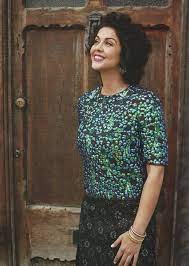
(EN) I can finally say that I now live in Italy. Because I have to say that until 2020, I always said that I lived “half and half”. I hadn’t lost the habit of working in London and honestly it was a little too much going up and down all the time. Then, with the pandemic I stayed in Italy and, for about 3 years, I haven’t been to London, I haven’t seen my family and now I’m used to it here, I’m fine. I have found a balance. I live just outside Florence
CH: Ho letto, nel tuo libro, la tua avventura in Italia. Quindi so che tu a un certo punto nella tua vita hai fatto un grande cambiamento, da un lavoro molto “demanding”, impegnativo, hai preso un periodo in Italia, come è stato?/ (EN) I read, in your book, your “adventure” in Italy. I know that, at some point, in your life you made a big change, from a very demanding job, you took a period off in Italy, what was it like?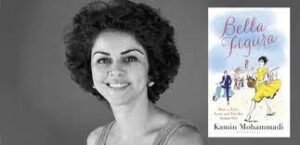
K: Allora, vivere qua è stato un” caso”. Io facevo un lavoro molto impegnativo, lavoravo moltissimo ma era la mia vita, non ne conoscevo un’altra; poi però lo stress ha condizionato la mia salute, così a un certo punto , quando questo lavoro è finito, per una serie di coincidenze, ho avuto la possibilità di venire a Firenze a scrivere un libro. Dovevo stare solo 6 settimane all’inizio. Avevo del tempo per scrivere e avevo bisogno di un posto tranquillo. Un’amica mi ha prestato la sua casa a Firenze. Questo appartamento avrebbe potuto essere in qualunque altra città, era a Firenze per caso!
(EN) I must say that living here happened by chance. At the time I had a very demanding job, I worked a lot but it was my life, it was the only lifestyle I knew; but then stress conditioned my life, my health, so at a certain point, when this job ended, due to a series of coincidences, I had the opportunity to come to Florence to write a book. I was supposed to stay only 6 weeks at the beginning. I finally had some time to write and needed a quiet place. A friend lent me her house in Florence. This apartment could have been in any other city, it was in Florence just by chance!
CH: Quindi sembra che tu sia arrivata veramente per caso …Anche se io non credo al caso. Credo che ci sia sempre un “disegno” in quello che facciamo…/(EN) It really seems that you came here by chance…Even if I don’t believe in chance. I believe there is always a “mysterious design” in whatever we do…
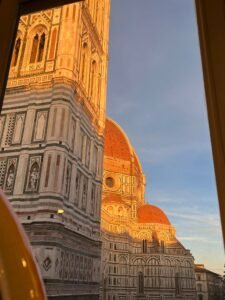
K: Sì, anche io, devo dire la verità! Ho viaggiato tantissimo ma non ero mai stata a Firenze e avevo sempre voluto visitare Firenze. Ora se ci penso non posso neanche dire perché …/ (EN) To be honest,I think so too! I traveled a lot, but I had never been to Florence even though I always dreamed to. Now that I think about it , I don’t even know why it was that…
Italiano? Nemmeno una parola !
CH: Quanto tu sei venuta parlavi un po’ italiano ?/ (EN) Did you speak some Italian when you first arrived?
K: Nemmeno una parola! Conoscevo la cultura perché la mia amica del cuore a Londra è una italiana, ma ho conosciuto, visitato l’Italia per la prima volta a trent’anni. Con la mia amica (si chiama Chicca) siamo andate in Sicilia per scrivere un libro e mi sono accorta che lì la gente non parlava inglese. Ma a Firenze io mi aspettavo, essendo una città turistica, che la gente parlasse più inglese. Almeno questo era 15 anni fa! Adesso è diverso.
All’epoca, io stavo nel quartiere San Niccolò e non c’erano turisti , era un quartiere molto fiorentino, con molti artigiani. Mi dicevano che era come l’Italia di 30 anni fa. Ora è tutto cambiato, purtroppo. C’è troppa folla, troppi turisti. Oggi è diverso, molto diverso ed è un grande peccato, devo dire la verità ..ma lasciamo stare! Quando sono arrivata era il 2008 e nessuno parlava inglese

(EN) Not a word! I knew the Italian culture because my best friend in London is Italian, but I visited Italy for the first time when I was in my thirties. With my friend (her name is Chicca) we went to Sicily to write a book and I realized over there, that a lot of people didn’t speak English. I thought this was only in Sicily, and I was surprised once in Florence! Being a tourist city, I expected more people to be able to speak English there. At least that was 15 years ago! It’s different now.
At the time, I was staying in the San Niccolò district and there were no tourists, it was a very Florentine neighborhood, with many artisans. They told me it was like Italy was 30 years ago. That has all changed now, sadly, I would say. There are too many crowds, too many tourists. Today is different, very different and it’s a big shame, I have to tell the truth..but never mind! When I arrived it was 2008 and nobody spoke English
CH: E allora come hai fatto?/ (EN) How did you manage?
K: Non lo so, ho comunicato in qualche modo!/ (EN) Have no idea! But I managed somehow!

CH: È vero che gli italiani sanno comunicare, con le espressioni del viso, con le mani, insomma anche senza conoscere le parole, loro non si fermano, non è un problema, la lingua non è per loro una barriera !/ (EN) CH: It’s true that Italians know how to communicate- They do it with facial expressions, with their hands, in short, they don’t stop even if they don’t have the words. This is not a problem, language is not a barrier for them!
K: Si infatti, io ho scoperto di essere uguale a loro e ci siamo capiti! In Italia io ho scoperto anche di sentirmi a casa. E questo non per il mio lato inglese, ma per il mio lato iraniano. Siamo più simili. Qui c’ è molta comunicazione, le persone sono piene di calore, sono socievoli. Dopo 3 giorni (e l’ho scritto nel mio libro) già conoscevo tutta la gente del quartiere. Dopo 3 anni a Londra non conoscevo i miei vicini. E questa è la grande differenza.
Qui la gente ti saluta per strada, la incontri di nuovo nel pomeriggio, quando ti vedono più di una volta , ti salutano, ti riconoscono! A Londra questo non c’è.
(EN) Yes indeed, I discovered that I was the same (as them) and we perfectly understood each other! In Italy I also discovered that I felt totally at home. This doesn’t come from my English side, it’ s rather my Iranian side. We are more alike. There is a lot of communication here, people are full of warmth, they are sociable. After 3 days (and I wrote it in my book) I already knew all the people in the neighborhood. After 3 years in London I didn’t know my neighbors. And this is the big difference. Here people greet you on the street, you meet them again in the afternoon, when they see you more than once, they greet you even more, they recognize you! In London this does not exist.
Italia Vs Inghilterra : abitudini
CH: Ti capisco. Io quando vivevo in Inghilterra (che ho molto amato, lì ho vissuto , ho lavorato..) e venivo in Italia in vacanza, notavo subito gli sguardi, per la strada. E’ come se la gente qui ti vede, si accorge che esisti. Se viaggi in treno in Inghilterra , per esempio, di solito le persone non ti guardano negli occhi, ognuno legge, fa le sue cose. E questo incontro di sguardi, di occhi , in Italia, non è irrivelante, è importante perché è un modo di realizzare che l’altro esiste, c’è. Questo per me ha un impatto importante. / (EN) I do understand. When I lived in England (a life that I loved very much, I love England..) and I came to Italy on vacation, I immediately noticed the looks in the street. It’s as if people here see you, realize you exist. If you travel by train in England, for example, usually people don’t look at you in the eyes, everyone reads, does their own thing. And these looks, the gaze, in Italy, is not irrelevant. It is important because it is a way of realizing that the other exists. This for me has an important impact.
K: Sono proprio d’accordo! Quando sono andata in Sicilia con la mia amica , lì in Sicilia a volte gli sguardi possono anche essere troppo intensi. Ma quando sono tornata a Londra ho sentito che mi mancava tutto questo. Anche la mia amica, che è cresciuta a Roma, ha detto che una volta in Inghilterra il fatto che nessuno la guardava, la faceva stare male. Un po’ deprimente. Si sentiva invisibile. E’ alla base di tutto questo che in Italia io mi sentivo viva, sentivo di esistere.
(EN) I totally agree! When I went to Sicily with my friend, sometimes looks can be too intense. But when I returned to London, I felt that I was missing all of this. Even my friend, who grew up in Rome, said that once in England, the fact that no one was looking at her, made her feel bad. A little depressing. She felt invisible. All this is what in Italy makes me feel alive and appreciated
CH: Qui anche il contatto fisico è diverso. Per esempio i baci sulle guance, stringere le mani, il toccare un braccio…è un modo per dire “ I care about you, ”mi importa di te, mi interesso a te. Questo in Inghilterra l’ho sentito molto diverso; ho dovuto imparare a comportarmi in modo differente per non essere invadente. – Come hai imparato italiano così bene?/ (EN) Even physical contact is different here. For example, kissing on the cheeks, shaking hands, touching an arm…it’s a way of saying “I care about you” I’m interested in you. This in England is very different; I had to learn to behave differently in order not to be intrusive. – How did you learn Italian so well?
K: All’inizio, quando scrivevo il libro , non sapevo quanto tempo sarei rimasta, quindi ero soprattutto concentrata sul libro. Comunque volevo comunicare con la gente, per esempio al mercato di Sant’Ambrogio. Quindi ho cominciato così, la radio italiana ( che non capisco) ma che ascoltavo sempre, poi parlare con la gente. Inoltre io canto, le arie dell’Opera e mi ha aiutato. Infine, a San Niccolò ho incontrato un signore anziano, Roberto, che voleva imparare inglese. E così lui aiutava me a leggere in italiano e io insegnavo a lui inglese. Uno scambio. Poi dopo ho conosciuto Bernardo, mio marito ora, che non parlava molto inglese. Le sue figlie erano piccole e non parlavano inglese e io ho imparato così, soprattutto “ a orecchio”.
(EN) In the beginning, when I was writing the book, I didn’t know how long I was going to stay in Italy, so I was mainly focused on the book. However, I wanted to communicate with people, for example at the Sant’Ambrogio market. So that’s how I started, always listening to the Italian radio (which I don’t understand), then talking to people. Also I sing opera and this helped me. Finally, in San Niccolò I met an elderly gentleman, Roberto, who wanted to learn English. And so he helped me to read in Italian while I taught him English. An exchange. Then later I met Bernardo, my husband now, who didn’t speak much English. His daughters were very young and didn’t speak English, so that’s how I learned, mostly “by ear”.
“Bella Figura “
CH: In Italiano io cerco sempre le “belle parole”; la “bella figura” è una di queste parole ma anche un concetto e tu hai fatto un’analisi splendida nel tuo libro./(EN) In Italian I always look for “beautiful words”; “bella figura” is one of them but also a concept and you have made a splendid analysis in your book.
K: Io per il libro ho scelto questa frase, questa idea e l’ho adattata ad una filosofia di vivere bene: mangiare bene, stare bene , sentirsi bene con se stessi. Ho creato come un concetto, una sorta di mindfulness che si lega a questo concetto. Sai, Chiara , per noi donne ci sono sempre mille libri e manuali che danno consigli su come si deve fare questo, quello…Io non volevo fare una lezione, “insegnare alle donne qualcosa”; volevo solamente dare dei consigli per stare bene con noi stesse basati sulla mia esperienza personale.
(EN) For the book I chose this phrase, this idea and adapted it to a philosophy of wellness: eating well, living a good life, feeling good about yourself. I made it into a kind of mindfulness that is strongly linked to the Bella Figura concept. You know, Chiara, for us women there are always a thousand books and manuals that give advice on how to do this, that… How we should be, how we should act ….I didn’t want to give another lesson, lecturing women about that. I just wanted to give advice, how to feel good about ourselves based on my personal experience.
CH: Infatti tu racconti che in Italia tu hai avuto una trasformazione. / (EN) You actually write how in Italy you had a real change.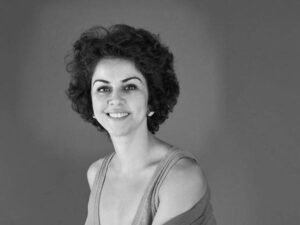
K: Sì, questo è il cuore del libro. Io soffrivo come tante donne di tanti problemi legati allo stress, e nella mia vita a Londra non riuscivo a calmarmi abbastanza. Quindi , per me, in Italia i grandi cambiamenti sono arrivati perché ho cominciato a vivere come vedevo fare intorno a me, seguendo la mentalità. A Firenze ho trovato un modo di essere più rilassato, meno ansioso, più concentrato sul godersi il momento. Un cambiamento di priorità.
(EN) Yes, this is the focus of the book. Like many women, I suffered from many stress related problems, and in my life in London I could not calm down enough. For me, the big changes happened while in Italy. I began to live as I saw people doing around me, following the mentality. In Florence I found a way to be more relaxed, less anxious, more focused on enjoying the moment. A change of priorities.
CH: Ovviamente anche in Italia c’è lo stress, ma in Italia è vero che c’è una diversa priorità delle cose. /(EN) Obviously, in Italy too there is stress. However it is true that here there is a different priority for things.
K: Ora, devo dire che con questo turismo eccessivo che invade le città, come abbiamo a Firenze, non lo so se la cosa è un po’ diversa. Qui vediamo a volte veramente uno tsunami di turisti e questo fa cambiare un po’ il carattere dei fiorentini. E mi dispiace. Tutto è diventato più globalizzato e si perde il lato tradizionale che amo molto e che caratterizza ogni città.
(EN) Now, I must say that with the excessive tourism invading cities, like we have in Florence, I don’t know if things are actually a bit different. Here sometimes we witness like a tsunami of tourists and this changes a bit the character of the Florentines. And I feel sorry about that. Everything has become more globalized and the traditional side that I love very much and that characterizes every city is lost.
Ringraziamenti
CH: Grazie mille Kamin per queste riflessioni. Prima di salutarti però voglio aggiungere che ti ammiro molto per quello che fai su un altro piano: il tuo lavoro per i diritti delle donne iraniane. Hai detto una volta che, in questo momento così difficile per le donne del tuo Paese, ti senti come un soldato e la tua spada è la tua penna. Grazie al tuo talento di scrittrice puoi fare qualcosa per questa battaglia per le donne in Iran, e ti ammiro e stimo molto per questo. Sono molto vicina alle donne in Iran e bisogna tenere sempre alta l’attenzione su questa realtà, perché non sia dimenticata.
Grazie ancora per questa bella chiacchierata!! (QUI uno degli ultimi articoli di Kamin )
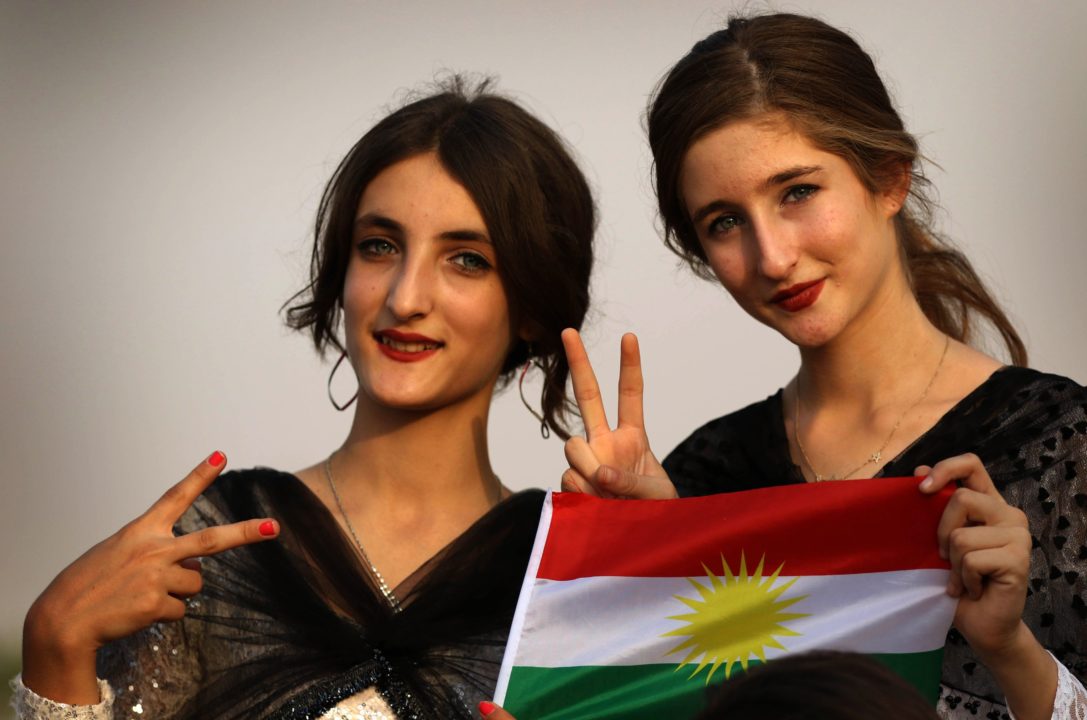
(EN) CH: Thank you very much Kamin for our exchange. Before saying goodbye, however, I want to add that I really admire you for what you do on another level: your work for Iranian women’s rights. You once said that, in this difficult moment for the women of your country, you feel like a soldier and your sword is your pen. Thanks to your talent as a writer, with your words you can do something for this battle for women in Iran, and I admire and respect you a lot for that.
I am very close to women in Iran. We must always keep talking about them so that their reality isn’t forgotten. (HERE one of her latest articles)
Thanks again for this nice chat!!